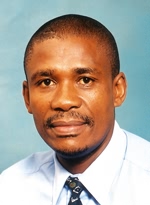NRF President lauds SAEON for pioneering partnerships in science
Dr Khotso Mokhele, President of the National Research Foundation (NRF) has declared himself "pleased and impressed" with the networks that SAEON has established, both locally and internationally, in the relatively short period of its existence.
|
"It is a remarkable achievement if an organisation such as SAEON can build strong relations with science councils such as the CSIR, ARC and Mintek, higher education institutions such as Wits, Cape Town and Stellenbosch, government departments such as Water Affairs and Forestry, and conservation-minded organisations such as SANParks, SANBI and SAIAB," he said.
Having just returned from a tour of Cuba’s science councils and research institutes, Dr Khotso Mokhele voiced his admiration for the integration and cohesion so apparent in the Cuban science system. "What clearly emerged from the talks and presentations there is that, in the face of critical national issues, each and every one of these organisations would join forces to address the issue," he explains. "For them, a national need takes precedence over individual mandates. The science system in Cuba knows no other way of working."
|
In South Africa, according to Dr Mokhele, this level of integration rarely happens. Organisations still tend to work in silos, addressing issues specific only to their mandate or to their discipline. There is very little communication between them and, when there is, such communication is often prescriptive, with one organisation dictating what another should be doing. This results in an ineffective system that takes much longer to detect problems and get to real solutions, which can moreover lead to spiralling costs.
This tendency to operate in isolation may well be encouraged by the competition for funding between organisations in the science system. "Competition can bring out the best in everyone," says Dr Mokhele, "but it can also be a decided drawback when it prevents the best solution from being aired."
With regard to problem identification, SAEON will be drawing on the strength of its partners and networks to extract the best information for national challenges, working in inter-organisational and inter-disciplinary teams. "There will be considerable integration in the research, analysis and interpretation of data and the delivery of products as required by the SAEON mandate," says SAEON Head Johan Pauw.
In conclusion Dr Mokhele said: "I must congratulate SAEON and its partners. There are not many organisations in South Africa that can lay claim to this kind of integration and cohesion. It shows foresight on the part of the partners, and this level of cooperation and integration bodes well for our local science system. I predict that, by working together as you have started to do, you will accomplish great things for South Africa’s science system into the future."











